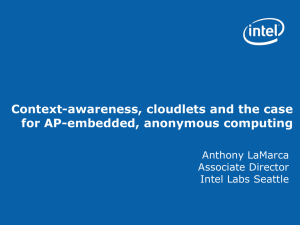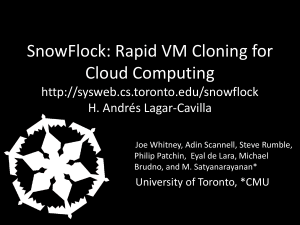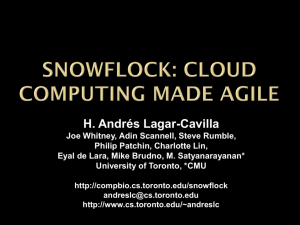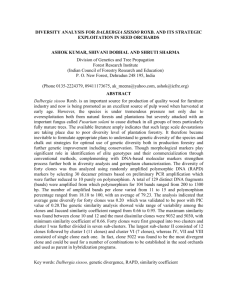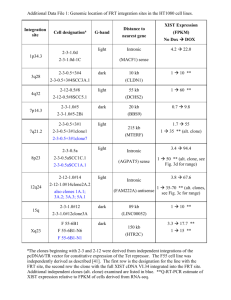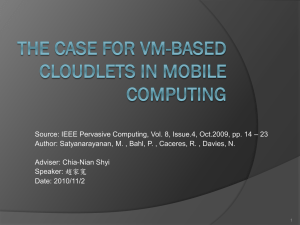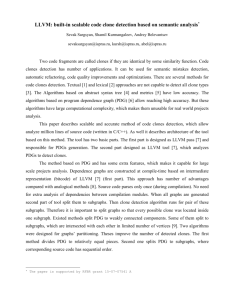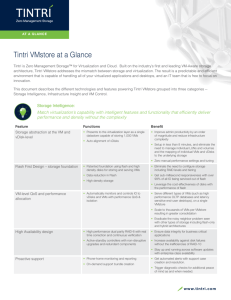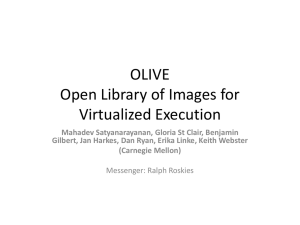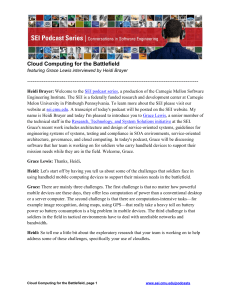Leveraging Fast VM Fork for Next Generation Mobile Perception
advertisement
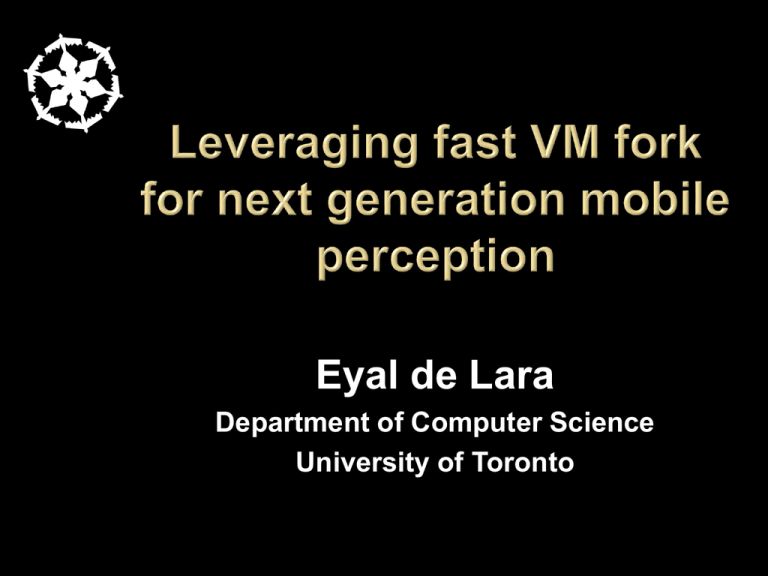
Eyal de Lara Department of Computer Science University of Toronto Health & assisted living, advertising, gaming, travel, social networking, task assistance and education, etc… Examples: Augmented reality Face recognition Automatic translation Activity recognition Huge pressure on mobile devices in terms of compute capacity, communication, and power budget High data rate sensors (Cameras and microphones) Compute intensive (real time classification & online learning) Interactive 3 Too much latency for real-time responsiveness Even 30 msec latency affect interactive performance Example latencies: Internet 2 RTT 50 – 200 msec. Median 3G RTT is 200 msec. 4 Bring the cloud closer: The Case for VM-based Cloudlets in Mobile Computing, Satyanarayanan, Bahl, Caceres, Davies Cloudlet: “data center in a box” Lots of cores with no power constraints one network hop away Leverage existing 802.11 protocols for service discovery, encryption, billing and authentication with no extra overhead Provides tight coupling between the network and the computation Incremental deployment 802.11n AP with a n-core CPU Low latency, high bandwidth 5 Mechanisms to guarantee execution integrity Privacy: Client should trust that no sensitive data is retained Correctness of execution: Clients and service provider should trust the correctness of the computation Developing applications that span the client, AP and cloud Seamless migration of execution between client, AP and cloud Supporting flexible business models Give users access to proprietary algorithms in exchange for context Provide micropayments to cloudlet owners in exchange for cycles Broker connections between advertisers and customers 6 Mechanisms to guarantee execution integrity Privacy: Client should trust that no sensitive data is retained Correctness of execution: Clients and service provider should trust the correctness of the computation Developing applications that span the client, AP and cloud Seamless migration of execution between client, AP and cloud Supporting flexible business models Give users access to proprietary algorithms in exchange for context Provide micropayments to cloudlet owners in exchange for cycles Broker connections between advertisers and customers 7 Stateful swift cloning of VMs Virtual VM Network 0 VM 1 VM 2 VM 3 VM 4 Host 0 Host 1 Host 2 Host 3 Host 4 State inherited up to the point of cloning Local modifications are not shared Clones make up an impromptu/transient cluster Master is persistent Clones state is ephemeral tix = sf_request_ticket(howmany) prepare_computation(tix.granted) me = sf_clone(tix) do_work(me) Just like UNIX fork() if (me != 0) send_results_to_master() sf_sync() Block… else scp … more in the future receive_results() sf_join(tix) Child VMs are gone Migrate computation to cloudlet Scale application on cloudlet 10 VMs are BIG: Don’t send all the state! Clones need little state of the parent Clones exhibit common locality patterns Clones generate lots of private state Send only what you really need Multicast Network hardware parallelism Prefetch: exploit locality patterns Heuristics Don’t send if I’ll overwrite Malloc: exploit apps generating new state 3. Heuristics: 4. 5. Multicast: 1. Fetch 2. Start only state exploit don’t with on-demand fetch net locality thehw ifbasics I’ll parallelism tooverwrite prefetch State: Virtual Disk, OS, Machine Processes VM Descriptor Metadata “Special” Pages Page tables GDT, vcpu ~1MB for 1GB VM ? Clone 1 Private State Multicast ? Clone 2 Private State 13 600 Clone set up Multicast descriptor 500 700 Milliseconds 600 500 400 300 200 100 0 Milliseconds 800 400 300 Xend resume code 200 Wait for clones to start 100 0 VM spawn Contact all hosts (from descriptor) Xend suspend code VM suspend (make descriptor) 14 32 VMs 800 Milliseconds Near-interactive parallel Internet service Leverage parallelism to do the task in seconds Examples Bioinformatics NCBI BLAST EBI ClustalW2 Render farm Quantitative finance farm Compile farm Cluster of 32 Dell PowerEdge, 4 cores Xen 3.0.3 1GB VMs, 32 bits, linux pv 2.6.16.29 128 total processors Obvious future work Applications Bioinformatics: BLAST, SHRiMP, ClustalW Quantitative Finance: QuantLib Rendering: Aqsis (RenderMan implementation) Parallel compilation: distcc 140 143min Ideal 120 SnowFlock 87min Seconds 100 110min 61min 80 60 7min 40 20min 20 0 Aqsis 128 processors BLAST (32 VMs x 4 cores) 1-4 second overhead ClustalW distcc QuantLib SHRiMP Hierarchical VM fork support VM fork over wireless 19 Cloudlets are an attractive solution for next generation context aware apps VM fork lends itself well for cloudlet computing. Sub-second cloning time Negligible runtime overhead http://sysweb.cs.toronto.edu/snowflock http://sourceforge.net/projects/snowflock delara@cs.toronto.edu Questions? 21
